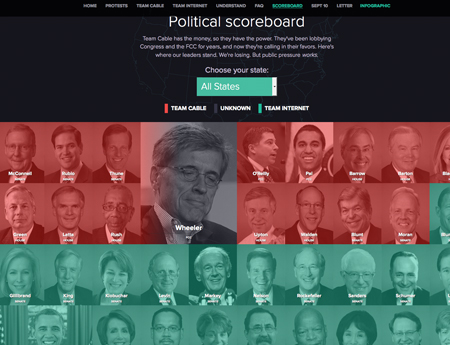U Reddit Here: Title II Gets ‘Social’

The smarter way to stay on top of broadcasting and cable industry. Sign up below
You are now subscribed
Your newsletter sign-up was successful
Beyond cat videos and selfies, the realm of social media has a less popular but potentially more pressing purpose as a driving, and uniting, force in the current effort to get the FCC to reclassify Internet access under Title II common carrier regulations.
That’s not surprising, given the issue is about protecting access to Internet destinations and apps such as…well, social media stops. So, much like the old Hair Club For Men slogan, social media sites aren’t only the venues, they’re also the “clients.”
From a powerful House member using Reddit to attempt to rebrand the push for strong open Internet rules, to a group rallying its online supporters to clog the FCC with phone calls, to the record-breaking flood of comments—over 4 million—in the official docket, online activism has gotten results.
One need look no further than 1600 Pennsylvania Ave. to see that impact. When the president announced he was going all-in for Title II reclassification, he began his YouTube video announcing the position with a simulated buffering symbol. That was a nod to an online protest during which websites boasted a faux buffering symbol to make a point about Internet service provider’s potentially slowing sites for anticompetitive reasons.
There was pushback four years ago from some of the same critics of anything short of Title II, but social media— Twitter, Reddit, etc.—and mobile broadband have exploded in the interim (as witness the FCC’s current consideration of applying its no-blocking or discriminating rules to mobile broadband, something it chose not to do last time around).
Even the National Cable & Telecommunications Association tried to fight fire with social media counterfire. It launched a stealth Web/Twitter platform, “Onward Internet,” a soft-sell campaign soliciting input on why the Internet is working just fine “unfettered by rules,” which is an argument cable operators have been making against Title II regs.
“Social media had a huge impact in quickly spreading the word about what the FCC was doing,” says Craig Aaron, president of Title II advocate Free Press. “And the fact that people rely on social media so much more than even a few years ago drives home for people just how important the free and open Internet is to their ability to connect and communicate.
The smarter way to stay on top of broadcasting and cable industry. Sign up below
“And whether people were finding out about Net Neutrality because they watched [HBO’s Last Week Tonight host] John Oliver on YouTube or because tumblr put the spinning wheel of death on their site during the Internet slowdown, they saw it and responded in record numbers. It completely changed the debate.”
Evan Greer, campaign director of Fight for the Future, which helped promote PopularResistance.org's Title II protest at FCC chairman Tom Wheeler’s house, agrees.
“We are always looking for new and innovative ways to use social media to both activate the huge base of support that exists on the Internet, and to pressure those in power who need to hear from the public,” she says.
Greer adds that on the battleforthenet.com site, they have a “political scoreboard” that allows Web surfers to easily tweet members of Congress “to either praise or shame them for supporting or opposing Title II.”
But Greer says it is more about channeling than driving the social media pushback. “While we certainly are very focused on using social media to achieve our goals, we are more often reacting to what we see on social media. Our task is not so much convincing people as channeling their energy into meaningful actions that make change,” she says.
FCC EXTRA!: ADS AREN’T NEWS
Journal Broadcasting’s KTNV Las Vegas will pay $115,000 to settle an FCC investigation into broadcasting paid commercials as though they were news reports.
The FCC’s Enforcement Bureau said last week that an ad agency had paid KTNV to produce and air so-called special reports about liquidation sales at local car dealers. “KTNV formatted the commercials in the style of news reports, which featured a KTNV staff person on location at the dealerships posing as a journalist,” the bureau said.
Under the terms of the settlement, Journal admits to the violation and will create a threeyear compliance plan and report periodically to the FCC.
Back in 2009, Valley Broadcasting-owned KVBC TV Las Vegas asked the FCC to investigate KTNV, alleging its failure to disclose the “reports” were ads.
“Broadcasters are not allowed to deceive the public by presenting commercial announcements or other paid programming in the guise of news or editorial content,” Travis LeBlanc, chief of the FCC’s Enforcement Bureau, said in a statement.
Contributing editor John Eggerton has been an editor and/or writer on media regulation, legislation and policy for over four decades, including covering the FCC, FTC, Congress, the major media trade associations, and the federal courts. In addition to Multichannel News and Broadcasting + Cable, his work has appeared in Radio World, TV Technology, TV Fax, This Week in Consumer Electronics, Variety and the Encyclopedia Britannica.

